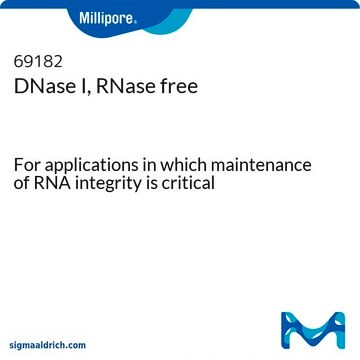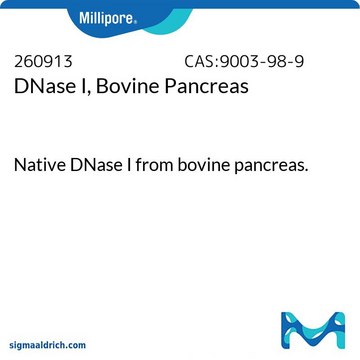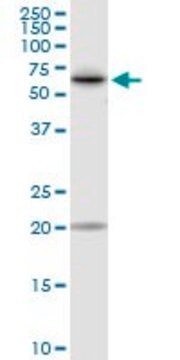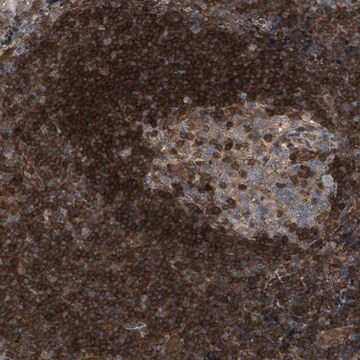AMPD1
DNase I
Amplification Grade
Synonym(s):
Deoxyribonuclease I
About This Item
Recommended Products
Quality Level
form
liquid
concentration
1 unit/μL
technique(s)
RT-PCR: suitable
color
colorless
shipped in
wet ice
storage temp.
−20°C
Related Categories
General description
DNase I digests double- and single-stranded DNA into oligo- and mononucleotides. Using the Reaction Buffer provided, DNA is removed from RNA preparations in a 15 minute digestion at room temperature. The DNase I is then inactivated by heating with the Stop Solution. Heating also denatures hairpins in the RNA, so the RNA can be used directly in reverse transcription.
No current RNA isolation procedure removes 100% of the DNA. Many commercial DNase I formulations are contaminated with residual RNases. This RNase contamination can destroy or degrade valuable RNA samples prior to reverse transcription. Laboratory comparisons have shown that Sigma′s Amplification Grade DNase I demonstrates lower RNase activity than that from several leading molecular biology product suppliers.
Application
- for the digestion of DNA during isolation and purification of RNA. The purified RNA can be used for the synthesis of cDNA using RNA reverse transcriptase.
- to hydrolyze extracellular matrix (ECM) components and enhance photosensitizer penetration into the biofilm to determine the efficacy of antimicrobial photodynamic therapy (aPDT) on Candida albicans biofilms
- to remove contaminating DNA from total RNA extracted from cattle blood samples
Features and Benefits
- Suitable for the elimination of DNA from RNA
- Minimal RNase activity available
- Optimized 10× reaction buffer and Stop Solution for complete inactivation of DNase I
Suitability
Unit Definition
Legal Information
Storage Class
10 - Combustible liquids
flash_point_f
Not applicable
flash_point_c
Not applicable
Certificates of Analysis (COA)
Search for Certificates of Analysis (COA) by entering the products Lot/Batch Number. Lot and Batch Numbers can be found on a product’s label following the words ‘Lot’ or ‘Batch’.
Already Own This Product?
Find documentation for the products that you have recently purchased in the Document Library.
Customers Also Viewed
Protocols
Method for reverse transcription of RNA into DNA. Uses a premixed reagent that contains reverse transcriptase, dNTPs, primers, RNase inhibitor and buffer. Fast generation of cDNA.
Related Content
The Spectrum Plant Total RNA Kit incorporates a new, patent-pending lysis and binding chemistry. This kit is intended to purify total RNA from species and tissue where most Total RNA protocols fail. Without sacrificing affordability, you can purify more total RNA per isolation.
Polymerase chain reaction (PCR) is a technique for amplifying nucleic acid molecules and is commonly used in many applications, including RT-PCR, hot start PCR, end point PCR and more.
Our team of scientists has experience in all areas of research including Life Science, Material Science, Chemical Synthesis, Chromatography, Analytical and many others.
Contact Technical Service












